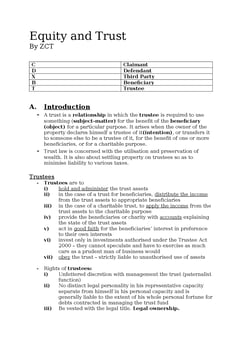Richards v Delbridge [1874] LR 18 Eq 11; [1874] 4 WLUK 4
Judgement for the case Richards v Delbridge
Table Of Contents
KEY POINTS
-
A voluntary gift is a heartfelt gesture where someone freely gives property or assets to another without expecting anything in return.
It's a simple yet powerful way to show appreciation, love, or support, often strengthening relationships and fostering community connections.
An intended property transfer is a deliberate action to pass ownership rights to someone else. It can be formal or informal, like a deed or a verbal agreement, and the aim is to ensure the well-being of loved ones, fulfill obligations, or simplify estate planning.
-
An invalid declaration of trust occurs when someone tries to establish a trust without meeting legal requirements, making it unenforceable.
Issues like incomplete documentation or failure to identify beneficiaries properly can result in an invalid declaration of trust, leading to potential confusion or legal disputes.
Professional legal guidance and adherence to legal standards ensure a valid and enforceable trust.
FACTS
-
In a significant turn of events, D., the owner of leasehold business premises and valuable stock-in-trade, took a decisive step shortly before his passing.
To secure the future of his grandson E., who actively participated in the family business despite being an infant, D. executed a memorandum.
This memorandum, bearing D.'s signature and endorsed on the lease itself, unequivocally declared:
This deed and all thereto belonging I give to E. from this time forth, with all the stock-in-trade.
This act of generosity and foresight was not only a testament to D.'s familial affection but also a strategic move to ensure the continuity and prosperity of the business.
Following this declaration, the lease, accompanied by the memorandum, was promptly delivered to E.'s mother, symbolizing D.'s aspirations for his grandson's future.
JUDGEMENT
-
Upon careful consideration of the presented evidence, the court unequivocally declared that there was no valid declaration of trust concerning the property in favor of E.
This conclusion was reached after thoroughly examining the circumstances and legal standards surrounding the purported declaration.
Despite the intentions expressed in the memorandum signed by D., the court found that it did not meet the necessary criteria to establish a legally binding trust in favor of E.
Thus, the court's ruling underscored the importance of adhering to the requisite legal formalities and standards when creating trusts, ensuring clarity and enforceability in property ownership and transfer matters.
COMMENTARY
The case delves into the knowledge of voluntary gifts, intended property transfers, and establishing trusts, shedding light on these concepts' legal complexities.
-
The narrative begins with D.'s poignant gesture towards his grandson, E., amid his ownership of leasehold business premises and valuable stock-in-trade.
D.'s execution of a memorandum, endorsed on the lease itself, manifested his earnest desire to secure E.'s future involvement in the family business.
This act symbolized D.'s familial affection and reflected his strategic foresight in ensuring the continuity and prosperity of the business.
The delivery of the lease, coupled with the memorandum, to E.'s mother underscored D.'s aspirations for his grandson's future, cementing the significance of his actions.
-
However, despite the heartfelt intentions expressed in D.'s memorandum, the court, after meticulous scrutiny, rendered a verdict negating the existence of a valid trust in favor of E.
The ruling underscored the imperative of adhering to stringent legal standards and formalities in establishing trusts.
While D.'s gesture was laden with sentiment and foresight, the absence of legal compliance rendered it unenforceable.
This case reminds us of the intricate interplay between legal formalities and heartfelt intentions concerning property transfer and trust establishment. It underscores the importance of seeking professional legal guidance to navigate the complexities of estate planning and property ownership effectively.
Ultimately, the judgment highlights the paramount importance of clarity and adherence to legal standards to ensure the validity and enforceability of such arrangements, safeguarding the interests of all involved parties.
For Further Study on Richards v Delbridge
Need instant answers? Our AI exam tutor is here to help.
Ask questions 🙋 Get answers 📔 It's simple 👁️👄👁️
Our AI is educated by the highest scoring students across all subjects and schools. Join hundreds of your peers today.
Get StartedSimilar Cases
Related Product Samples
These product samples contain the same concepts we cover in this case.
| Trusts and Equity | Constitution Long Notes (44 pages) |
| Trusts and Equity | Formalities Constitution Of Trusts Incompletedly Constituted Trusts Notes (57 pages) |

